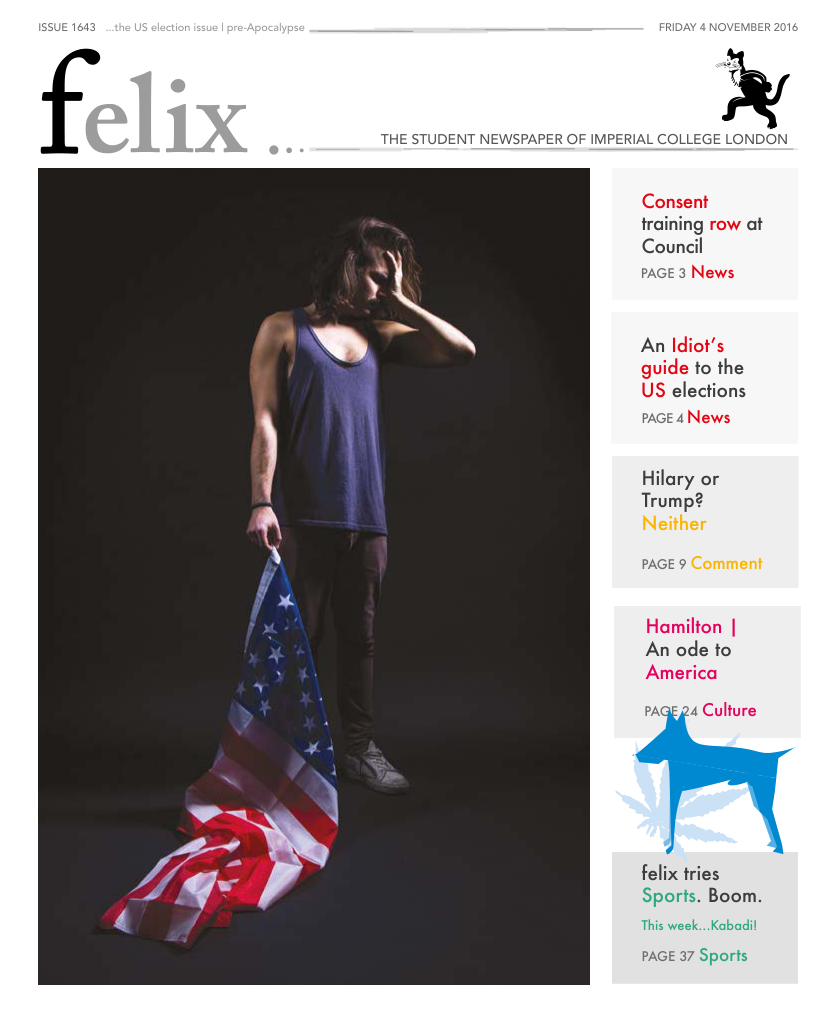Consent training row at Imperial
RCSU president questions funding of Consent Matters software

The RCSU president, Lloyd James, has stepped forward to question Imperial College’s latest investment in student welfare, namely the licence purchase of an online consent training course, which was financed by College and cost a total of £ 5,000.
The challenge was first made at the first council meeting of this academic year, which took place last week and saw sabbatical officers presenting their reports. During the presentation of the Deputy President’s report by Emily Jane Cramphorn, James brought up the consent training course, suggesting that the funds spent on the licensing could have been spent better elsewhere. Cramphorn defended the program by saying that the funding, having come directly from College and not the Union, meant that the consent training would not drain resources from Clubs and Societies.
However this doesn’t seem to have appeased James. In a comment piece submitted to felix, about the importance of Council for holding staff and sabs to account, he illustrates his point with “a particularly wasteful Union expenditure as an example”, referring to the consent training program.
Since the start of the academic year, there have been two sexual harassment testimonials published in felix
In his comment piece, James says that the concept of consent is sufficiently explained through the infamous ‘Tea and Consent’ animation which was released by the British Police in 2015. He writes that “anyone who thinks that potential rapists exist on campus simply because they were never presented with a cartoon telling them that ‘you shouldn’t have sex with unconscious people’ is utterly delusional.” He concludes that “this purchase will contribute nothing to the student experience on campus,” and refers to the funds that went into the consent training program as “£5,000 completely and utterly wasted”.
Additionally, the RCSU General Committee voted unanimously to condemn the expenditure. The specific wording of the motion passed was as follows. “The Royal College of Science Union condemns the spending by College on the Consent Matters software which we believe to be a wasteful and ineffective method of informing students on the important issue of consent.”
In reply to James’ piece, Cramphorn (whose manifesto points included delivering consent workshops), commented that “cases such as Stanford, Columbia and others across UK universities have highlighted that the sector is not equipped to support students who are victims of sexual violence. Unfortunately the UK's Sex & Relationship Education (SRE) does not encompass consent, and this means that there are many young people who may not understand what behaviour is acceptable and what behaviour isn't and what makes a healthy approach to relationships.”
Cramphorn indeed has a point. A recent government requested report published earlier this October by Universities UK shows that sexual harassment on campus is a major issue, which the education sector is not sufficiently tackling.
Spokesperson for The 1752 Group Dr Anna Bull said that “despite the increasing pressure on universities to curb a rise in on-campus assaults and improve their safeguarding policies, young women are nevertheless often terrified about the consequences if they make a complaint, particularly about a staff member. So often when they do, the university’s chief concern is to downplay any wrongdoing and protect its own reputation by keeping the whole thing quiet.
More needs to be done to protect women at British universities. They need to be encouraged to report assault and harassment. In the US, universities are obligated to investigate any such claims under federal law, regardless of any criminal investigation.”
Cramphorn adds that “as an institution and as a Students' Union we have a duty of care towards our students, to both create a healthy, respectful community, and to ensure that we are able to support students who have experienced sexual violence. Currently the idea of Consent Training is still in review and evaluation processes and hasn't yet been rolled out to the student body, but it is one of the steps we and the college are taking to produce an institutional response towards tackling sexual violence on campus”
Since the start of the academic year, there have been two sexual harassment testimonials published in felix by female students, who chose to remain anonymous.









